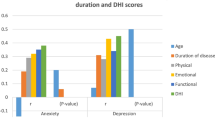Abstract
Objective
The objective of this study was to validate the German version of the Vertigo Symptom Scale (VSS) and to determine its ability to differentiate the type, frequency, and severity of balance disorders. The scale (34 items) was designed by Yardley and coworkers and has been already validated in its English and Spanish versions.
Methods
98 patients with organic vertigo syndromes, 90 patients with somatoform (psychogenic) dizziness and 56 healthy controls were evaluated with the VSS and additional standardized questionnaires regarding distress (SCL-90R), quality of life (SF-36), anxiety and depression (HADS). In order to differentiate organic from somatoform dizziness all patients underwent detailed clinical neurological and vestibular neurophysiological testing.
Results
The two identified subscales ‘vertigo and related symptoms’ (VER) and ‘somatic anxiety and autonomic arousal’ (AA) had good internal consistencies (Cronbach’s alpha: VER 0.79; AA 0.89). Test-retest correlations were r = 0.75 for VER and r = 0.75 for AA. VER could discriminate well between dizziness patients and healthy controls. AA discriminated moderately between somatoform and organic dizziness. We found close relations between the AA scale and different measures of emotional distress. Correlations between VER and measures of emotional distress were weaker.
Conclusion
The German version of the VSS has good reliability and validity in the detection of different vertigo syndromes. Measurement of anxiety symptoms can be helpful to identify patients with somatoform dizziness.
Similar content being viewed by others
References
American Academy of Opthalmology and Otolaryngology (1995) Committee on Hearing and Equilibrium guidelines for the diagnosis and evaluation of therapy in Menière’s disease. Otolaryngol Head neck Surg 113:181–185
Balaban CD, Thayer JF (2001) Neurological bases for balance-anxiety links. J Anxiety Disord 15:53–79
Baloh RW, Furman JM (1989) Modern vestibular function testing. West J Med 150:59–67
Best C, Eckhardt-Henn A, Diener G, et al. (2006) Interaction of somatoform and vestibular disorders. J Neurol Neurosurg Psychiatry 77:658–664
Brandt T (1999) Vertigo: its multisensory syndromes (2nd edition). Springer, London
Bullinger M, Kirchberger I (1998) Der SF-36 Fragebogen zum Gesundheitszustand. Handbuch für die deutschsprachige Fragebogenversion. Hogrefe Verlag, Göttingen
Clark MR, Sullivan MD, Fischl M, et al. (1994) Symptoms as a clue to otologic and psychiatric diagnoses in patients presenting with dizziness. J Psychosom Res 38:461–470
Cronbach L (1951) Coefficient alpha and the internal structure of tests. Psychometrika 16:297
Dieterich M, Brandt T (1999) Episodic vertigo related to migraine (90 cases): vestibular migraine? J Neurol 246:883–892
Dieterich M, Brandt T (1993) Ocular torsion and tilts of subjective visual vertical are sensitive brainsteam signs. Ann Neurol 33:292–299
Eagger S, Luxon LM, Davies RA, et al. (1992) Psychiatric morbidity in patients with peripheral vestibular disorder: A clinical and neuro-otological study. J Neurol Neurosurg Psychiatry 55:383–387
Eckhardt-Henn A, Best C, Bense S, et al. (2008) Psychiatric comorbidity in different vestibular vertigo syndromes. J Neurol 255:420–428
Eckhardt-Henn A, Breuer P, Thomalske C, et al. (2003) Anxiety disorders and other psychiatric subgroups in patients complaining of dizziness. J Anxiety Disord 17:369–388
Eckhardt-Henn A, Dieterich M (2005) Psychiatric disorders in otoneurology patients. Neurol Clin 23:731–749
Franke G (1995) SCL-90-R: Die Symptom- Checkliste von Derogatis – Deutsche Version – Manual. Beltz Test, Göttingen
Godemann F, Koffroth C, Neu P, et al. (2004) Why does vertigo become chronic after neuropathia vestibularis? Psychosom Med 66:783–787
Godemann F, Siefert K, Hantschke- Bruggemann M, et al. (2005) What accounts for vertigo one year after neuritis vestibularis- anxiety or dysfunctionl vestibular organ? Psychiatr Res 39:529–534
Herrmann C, Buss U, Snaith RP (1995) HADS-D Hospital Anxiety and Depression Scale, Deutsche Version: Ein Fragebogen zur Erfassung von Angst und Depressivität in der somatischen Medizin. Testdokumentation und Handanweisung. Huber, Bern
Honrubia V (1994) Quantitative vestibular function tests and the clinical examination. In: Herdmann SJ (ed) Vestibular rehabilitation. Davis, Philadelphia, pp 113–164
Jacob RG, Furman JM, Durrant JD, et al. (1996) Panic, agoraphobia, and vestibular dysfunction. Am J Psychiatry 8:530–535
Jacob RG, Furman JM (2001) Psychiatric consequences of vestibular dysfunction. Curr Opin Neurol 14:41–46
Luxon LM (2004) Evaluation and management of the dizzy patient. J Neurol Neurosurg Psychiatry 75:45–52
Mendel B, Bergenius J, Langius A (1999) Dizziness symptom severity and impact on daily living as perceived by patients suffering from peripheral vestibular disorder. Clin Otolaryngol Allied Sci 24:286–293
Neuhauser HK, von Brevern M, Radtke A, et al. (2005) Epidemiology of vestibular vertigo: A neurotologic survey of the general population. Neurology 65:898–904
Staab JP, Ruckenstein MJ (2003) Which comes first? Psychogenic dizziness versus otogenic anxiety. Laryngoscope 113:1714–1718
Staab JP (2000) Diagnosis and treatment of psychologic symptoms and psychiatric disorders in patients with dizziness and imbalance. Otolaryngol Clin N Am 33:617–635
Wittchen HU, Burke, JD, Semler G, et al. (1989) Recall and dating of psychiatric symptoms. Test retest reliability of time-related symptom questions in a standardized psychiatric interview. Arch Gen Psychiatry 46:437–443
Yardley L, Masson E, Verschuur C, et al. (1992) Symptoms, anxiety and handicap in dizzy patients: Development of the vertigo symptom scale. J Psychosom Res 36:731–741
Yardley L, Medina SM, Jurado CS, et al. (1999) Relationship between physical and psychosocial dysfunction in Mexican patients with vertigo: A cross-cultural validation of the vertigo symptom scale. J Psychosom Res 46:63–74
Yardley L, Owen N, Nazareth I, et al. (2001) Panic disorder with agoraphobia associated with dizziness: characteristic symptoms and psychosocial sequelae. J Nerv Ment Dis 189:321–327
Yardley L (1998) Fear of imbalance and falling. Rev Clin Gerontol 8:23–29
Yardley L (2000) Overview of psychologic effects of chronic dizziness and balance disorders. Otolaryngol Clin N Am 33:603–616
Author information
Authors and Affiliations
Corresponding author
Rights and permissions
About this article
Cite this article
Tschan, R., Wiltink, J., Best, C. et al. Validation of the German version of the Vertigo Symptom Scale (VSS) in patients with organic or somatoform dizziness and healthy controls. J Neurol 255, 1168–1175 (2008). https://doi.org/10.1007/s00415-008-0863-1
Received:
Revised:
Accepted:
Published:
Issue Date:
DOI: https://doi.org/10.1007/s00415-008-0863-1




